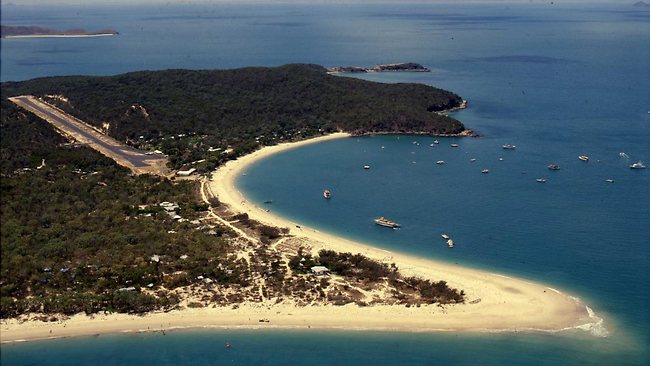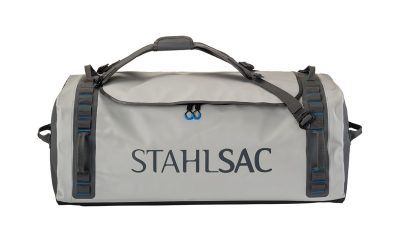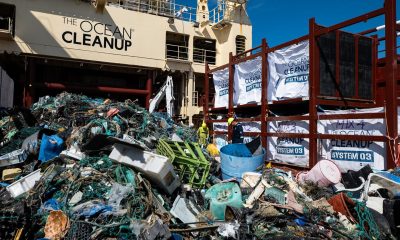Marine Life & Conservation
Documents reveal the Great Barrier Reef Marine Park Authority had serious concerns over $600m resort development

Documents obtained by The Australian Broadcasting Corporation under Freedom of Information reveal that the Great Barrier Reef Marine Park Authority (GBRMPA) identified serious concerns with a huge marina development it later approved.
Both the Queensland and federal governments have given the go ahead to a $600 million eco-tourism resort on Great Keppel Island, the first major development within the reef in 20 years.
But in approving the development’s marina and sewage systems, the marine park authority found the proponent’s environmental impact statement was contradictory, vague and missing a substantial amount of information.
Marine park officers also warned that the impacts of the development on water quality and coral communities on nearby vulnerable reefs could not be adequately mitigated.
Just two months later however, the marine park authority approved the development – subject to conditions.
There has not been a tourism project of this scale in Queensland in a quarter of a century.
The Great Keppel Island “premier eco-luxury” resort will boast a 250-room beachfront hotel, 350 apartments, and 700 luxury villas.
The developer of the project, Tower Holdings, says the project has been designed to be “a world leader in global environmental tourism” and will produce more clean energy than it uses by using 24,000 solar panels.
The resort will also have a 250-berth marina and championship golf course designed by Greg Norman.
The former world number one golfer is an enthusiastic supporter and is quoted on the resort’s website as saying that nowhere in the world “matches the offering of this place.”
But it took Tower Holdings seven years to win official support for the resort project.
It won federal approval in March last year. But owing to environmental concerns, the then federal environment minister Tony Burke attached 96 conditions, including management plans over the resort’s impact on corals and marine species.
“The conditions I have imposed will ensure that the outstanding universal value of the Great Barrier Reef is not diminished by this development,” Mr Burke said at the time.
The Newman Government had approved the project just days earlier.
But before the company could start any work it required approval from the Great Barrier Reef Marine Park Authority, because the resort would include a marina, breakwaters, and a sewage transfer facility that would lie within the marine park.
According to the GBRMPA, the proposed marina would be just 100 metres from a coral reef that was classified as a sensitive environment.
Documents obtained by The Australian Broadcasting Corporation under freedom of information have revealed that after a long process, officers from the GBRMPA floated two options.
One was to “approve the application with strict conditioning.”
Those conditions included a limit to the amount of nitrogen that could be discharged, meaning the developer would have to treat any sewage to a higher standard.
Then there was the second option the authority could take and that was to reject the application.
That rejection would be based on the conclusion that “the information provided by the [environmental impact statement] with which to make an accurate assessment for a proposed sewage discharge pipeline and sewage irrigation scheme is often contradictory, vague or missing entirely.”
There was also concerns that “the concentration of nutrients in the sewage that the resort would discharge was too high,” and that “the water quality guidelines for nitrogen at Great Keppel Island are already exceeded and freshwater wet season plumes from the Fitzroy have resulted in coral bleaching at the island.”
“The cumulative impacts of this development on water quality and coral communities on the vulnerable fringing reefs of Great Keppel Island cannot be adequately mitigated,” the document said.
Another document warned that while the amounts of effluent expected to be generated were not significant, “the risk is potentially high.”
In one email, a GBRMPA officer poses a question: “The major difficulty will be if [Great Keppel Island] have (sic) to discharge more than the stated maximum volumes and nutrient load limits, what then? How will we deal with this situation and is the delegate willing to undertake these action when (not if) these breaches of permit conditions occur?”
The documents also warn that the developer’s environmental impact statement does not account for anticipated climate change impacts like increased rainfall, warning this underestimation could increase the frequency of sewage discharges into the marine park.
Marine park officers also warned that the discharge risk would be heightened even further because the size of the proposed sewage storage pond was too small.
“The last thing you want to be doing is pumping effluent into the Great Barrier Reef, particularly when there are these conditions when the Marine Park Authority themselves have said, ‘We don’t know if they’re going to be strong enough to fix the problem’,” Queensland Greens Senator and environment spokeswoman Larissa Waters said.
A couple of months after these concerns were raised inside the GBRMPA, the organisation issued a permit for the development of the 250-berth marina, sewage facility, and other projects to go ahead.
It imposed conditions on the developer while highlighting that the fringing reefs at the island were among the most high value systems in the whole Great Barrier Reef.
“I’m worried that GBRMPA is coming under political pressure to approve things, even though they hold internal concerns about the damage those projects might do to the reef,” Senator Waters said.
“I think that’s wrong and I don’t think that’s GBRMPA’s fault. I think that’s the fault of the government of the day letting it be known that things must be approved for political reasons.”
The Federal Department of Environment says sewage will be treated to a tertiary level and used on the island for irrigation.
Tower Holdings says it has agreed to the conditions but has not disclosed how sewage will be treated.
Project manager Anthony Aiossa says the project went through a rigorous planning process, spanning nearly eight years.
“GBRMPA and the other various government departments have done exactly what they are supposed to do as part of an EIS process,” he said.
“They need to consider any potential for unacceptable impacts. If there were any, the project simply would not have been given the green light by both State and Federal Governments.”
Queensland’s Minister for State Development, Infrastructure and Planning, Jeff Seeney, says state approval was given by the independent Coordinator-General, after alterations were made to the EIS.
“Our approvals process is the best in the world and I stand by that and I am happy to have it compared to anything,” he said.
“We have a process that is as thorough as we can make it because we are a pro-development Government; we are about building things; we are about developing the opportunities for the next generation of Queenslanders but we are determined to do that at a world class standard.”
A spokesman for former federal environment minister Tony Burke says the additional 96 conditions imposed were designed to ensure that the “outstanding universal value of the Great Barrier Reef was not diminished by the development”.
The GBRMPA responded to questions from the ABC with the following statement:
The Great Keppel Island Resort development proposal was assessed under the Environment Protection and Biodiversity Conservation Act 1999 (EPBC) and the Great Barrier Reef Marine Park Act 1975.
The Great Barrier Reef Marine Park Authority issued two permits to GKI Resort Pty Ltd which will allow:
- construction of submerged and buried utilities pipeline for potable water, electricity and telecommunication
- construction and operation of a 250-berth marina
Both of these permits were approved with strict conditions to help protect biodiversity, heritage and social values of the marine park. The conditions, which the proponent must meet, also address public concerns raised in the public submission process.
The concerns raised in the email dated February 4, 2013 were discussed with the applicant and relate to a proposed sewage discharge pipeline and impacts on water quality and coral communities of Great Keppel Island’s fringing reefs.
The applicant, GKI Resort Pty Ltd, advised the Great Barrier Reef Marine Park Authority on February 15, 2013 that upon further consideration the design had been modified to no longer include a sewage discharge pipeline.
As such no permit was issued for a sewage discharge pipeline.
Any remaining risks were addressed through the strict conditions which the Great Barrier Reef Marine Park Authority imposed on the two permits issued.
Source: www.abc.net.au
Blogs
The Ocean Cleanup Breaks 10,000,000 KG Barrier

The Ocean Cleanup, the global non-profit project, has removed a verified all-time total of ten million kilograms (22 million lbs.) of trash from oceans and rivers around the world – approximately the same weight as the Eiffel Tower.
To complete its mission of ridding the oceans of plastic, The Ocean Cleanup uses a dual strategy: cleaning up the Great Pacific Garbage Patch (GPGP) to remove the plastic already afloat in the oceans, while stopping the flow of plastic from the world’s most polluting rivers.
Through cleaning operations in the GPGP and in rivers in eight countries, the cumulative total of trash removed has now surpassed ten million kilograms. This milestone demonstrates the acceleration of The Ocean Cleanup’s impact, while underlining the astonishing scale of the plastic pollution problem and the need for continued support and action.
While encouraging for the mission, this milestone is only a staging point: millions more tons of plastic still pollute our oceans and The Ocean Cleanup intends to continue learning, improving and innovating to solve this global catastrophe.
This announcement comes as governments from around the world meet to continue negotiations to develop a new legally binding instrument to end plastic pollution at INC4 in Ottawa, Canada. Representatives of The Ocean Cleanup will be in attendance and the organization will be urging decision-makers to collaborate towards a comprehensive and ambitious global treaty which addresses plastic at all stages of its life cycle and in all marine environments worldwide, including in areas beyond national jurisdiction.
It is encouraging to see that the need for remediation is reflected in the various options for potential treaty provisions. It is essential that the final treaty contains clear targets for the remediation of legacy plastic pollution, and reduction of riverine plastic emissions.
Tackling plastic pollution requires innovative and impactful solutions. The treaty should therefore incentivize the innovation ecosystem by fostering innovations that make maximal use of data, technology and scientific knowledge – such as those designed and deployed by The Ocean Cleanup.
‘After many tough years of trial and error, it’s amazing to see our work is starting to pay off – and I am proud of the team who has brought us to this point.’ said Boyan Slat, Founder and CEO of The Ocean Cleanup. ‘While we still have a long way to go, our recent successes fill us with renewed confidence that the oceans can be cleaned.’
The Ocean Cleanup was founded in 2013 and captured its first plastic in 2019, with the first confirmed catch in the GPGP coming soon after the deployment of Interceptor 001 in Jakarta, Indonesia. After surpassing one million kilograms of trash removed in early 2022, the non-profit project has since progressed to the third iteration of its GPGP cleaning solution, known as System 03, and a network of Interceptors currently covering rivers in eight countries, with more deployments set for 2024.
About The Ocean Cleanup
The Ocean Cleanup is an international non-profit organization that develops and scales technologies to rid the world’s oceans of plastic. They aim to achieve this goal through a dual strategy: stemming the inflow via rivers and cleaning up the legacy plastic that has already accumulated in the ocean. For the latter, The Ocean Cleanup develops large-scale systems to efficiently concentrate the plastic for periodic removal. This plastic is tracked and traced through DNV’s chain of custody model to certify claims of origin when recycling it into new products. To curb the tide via rivers, The Ocean Cleanup has developed Interceptor™ solutions to halt and extract riverine plastic before it reaches the ocean. Founded in 2013 by Boyan Slat, The Ocean Cleanup now employs a broadly multi-disciplined team of approximately 140. The foundation is headquartered in Rotterdam, the Netherlands.
For more information, visit: theoceancleanup.com and follow @theoceancleanup on social media.
Marine Life & Conservation
Steve Backshall to headline Shark Trust’s flagship event: For the Love of Sharks

Join a host of amazing, shark loving, speakers including Steve Backshall and the Shark Trust team for an evening celebrating shark conservation at the Royal Geographical Society in London this November.
Date: 29th November 2024
Time: 6-10pm
Location: Royal Geographical Society, London
Tickets: https://www.sharktrust.org/Event/flos24
The event will be a celebration of all things shark. Those lucky enough to get hold of tickets will hear from engaging guest speakers with a passion for sharks.
The line-up includes (*subject to change if unforeseen circumstances arise)
Steve Backshall: One of television’s busiest presenters, BAFTA award-winning wildlife expert Steve has been passionate about the wild world ever since he was young.
Steve’s impressive TV career has taken him all around the world, investigating a wide array of species and environments. Steve has filmed over 100 hours of children’s wildlife programmes with the BAFTA award winning Deadly 60 franchise and recently, with Sky Nature, for his new series ‘Whale with Steve Backshall’. He has been a patron for the Shark Trust for 10 years.
Simon Rogerson: is a photojournalist specialising in natural history, diving and the sea.
He is editor of SCUBA magazine, the official journal of the British Sub-Aqua Club. Simon started his career as a crime reporter but gravitated towards his ‘less depressing’ interest in underwater exploration, joining the staff of DIVE magazine in 1999. In 2005 he was named ‘Editor of the Year’ in the PPA’s Independent Publishing Awards. Simon also works as a freelance writer, contributing frequently to the Sunday Times and Telegraph, in addition to BBC Wildlife, Esquire, and a host of international diving magazines. He is the author of a book, Dive Red Sea, published by Ultimate Sports. Now based in Berkshire, Simon has been a Patron of the Shark Trust for 20 years.
More speakers to be announced soon. Head to the Shark Trust website to learn more.
The evening will also allow guests the final chance to see the Oceanic 31, shark art exhibition. Some of the artwork will be auctioned/raffled at the event, while the rest will be auctioned online to raise money for the Shark Trust Oceanic Programme.
For the Love of Sharks is an evening with something for everyone who is interested and fascinated by sharks. Join the Shark Trust, their Patrons, Trustees and Staff, along with a host of supporters for this celebration of shark conservation.
For more information or to buy a ticket: https://www.sharktrust.org/Event/flos24
-

 News3 months ago
News3 months agoCapturing Critters in Lembeh Underwater Photography Workshop 2024: Event Roundup
-

 Marine Life & Conservation Blogs3 months ago
Marine Life & Conservation Blogs3 months agoCreature Feature: Swell Sharks
-

 Blogs2 months ago
Blogs2 months agoMurex Resorts: Passport to Paradise!
-

 Blogs2 months ago
Blogs2 months agoDiver Discovering Whale Skeletons Beneath Ice Judged World’s Best Underwater Photograph
-

 Gear Reviews3 weeks ago
Gear Reviews3 weeks agoGEAR REVIEW – Revolutionising Diving Comfort: The Sharkskin T2 Chillproof Suit
-

 Gear Reviews3 months ago
Gear Reviews3 months agoGear Review: Oceanic+ Dive Housing for iPhone
-

 News2 months ago
News2 months agoPADI Teams Up with Wellness Brand Neuro to Drive Ocean Change and Create a Blue State of Mind
-

 Marine Life & Conservation2 months ago
Marine Life & Conservation2 months agoSave the Manatee Club launches brand new webcams at Silver Springs State Park, Florida

















